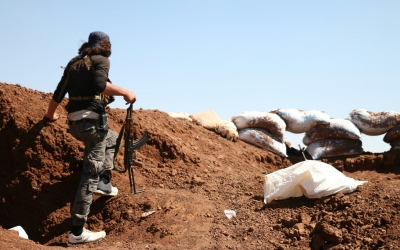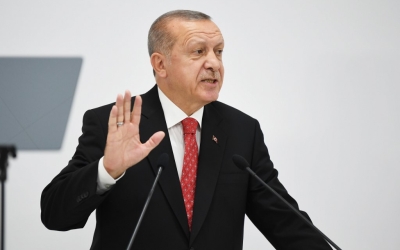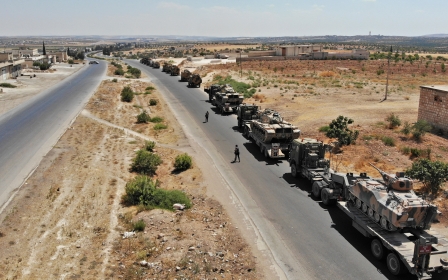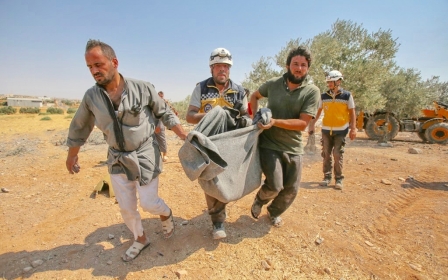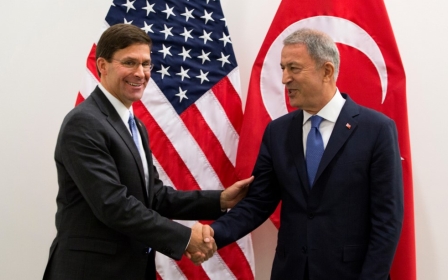Syrian government forces overrun key rebel town Khan Sheikhoun
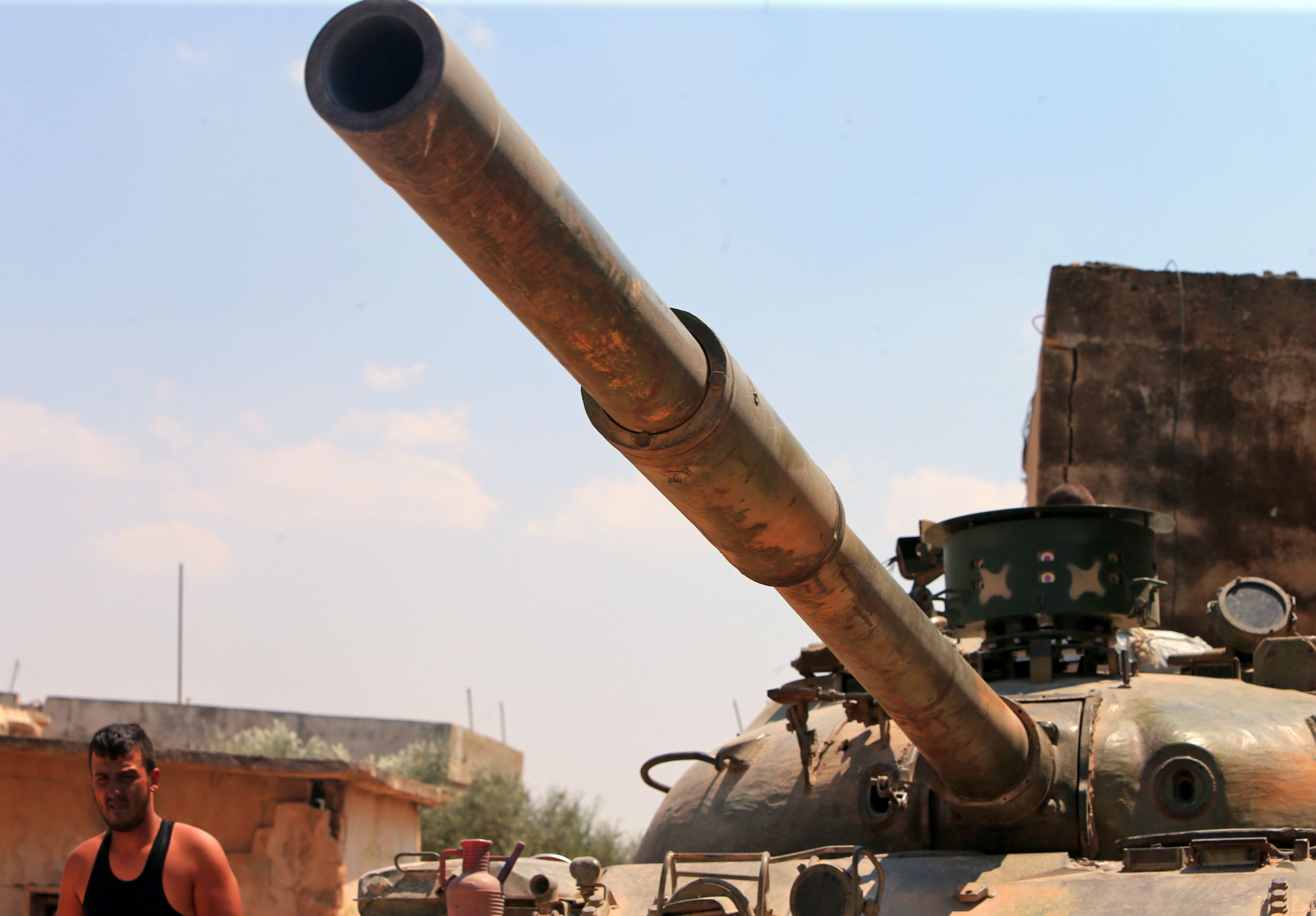
Syrian government forces overran Khan Sheikhoun on Tuesday, though activists said fighting is still ongoing in the strategic Idlib province town.
Many militants and allied rebel fighters have withdrawn from the town, activists reported, as forces loyal to President Bashar al-Assad pushed their offensive.
However, a local source told Middle East Eye that fierce clashes in Khan Sheikhoun are still ongoing and some fighters have not fully abandoned the town.
Hay’at Tahrir al-Sham (HTS), a powerful militant group operating in the area, similarly denied that its fighters had withdrawn, saying that they had repositioned in the town’s south during the night and they still held areas in northern Hama.
The Syrian Observatory for Human Rights, a UK-based activist group, suggested earlier on Tuesday that rebel and militant fighters had completely pulled back from the town of Khan Sheikhoun and the surrounding villages to its south overnight.
Assad's forces entered Khan Sheihkoun late on Monday, according to the Observatory.
The town lies at the southern tip of Idlib province, the last remaining rebel stronghold after eight years of conflict with Assad's government. HTS has control of most of the province after a series of battles against Turkey-backed rebel groups in the area.
Meanwhile, fierce bombardment of the rebel-held towns Maaret al-Numan, Tell Mannas, Hish, Jarjnaz and al-Tah, which lie to the north of Khan Sheikhoun, has not let up since the early hours of Tuesday, according to activists.
Mohamed Katoub, advocacy officer for the Syrian American Medical Society (SAMS), told MEE that people had already fled Khan Sheikhoun and the surrounding area over the past few days, and a wave of displacement is currently taking place in the Maaret al-Numan area.
Othman al-Khani, an activist who fled Khan Sheikhoun with his family in February, said 130,000 people, both natives and people displaced from elsewhere, lived in the town before the government offensive.
'The few families who have stayed despite the bombings are the ones who could not bear the burden of displacement'
- Othman al-Khani, activist
“Khan Sheikhoun has become almost empty. The few families who have stayed despite the bombings are the ones who could not bear the burden of displacement, nor the cost,” Khani told MEE from Idlib.
Katoub said people are fleeing either towards the Turkish border - with the Syrian town of Dana receiving the majority of them - or to the Aleppo countryside.
“The humanitarian situation is tragic as the camps have reached full capacity and people are starting to reside out in the open,” Mohamed Hallaj, director of the Response Coordination Group NGO, told MEE.
“We are afraid that as the number of the displaced grows, the humanitarian response will weaken … Humanitarian operations have so far only been able to cover 30 percent of what is actually needed.”
Turkish convoy
The latest developments come as a Turkish military convoy has come unstuck in Idlib province after being targeted by pro-Syrian government forces, which blocked its advance with heavy bombardment.
A separate local source told MEE that the convoy is still standing where it was halted the day before, on the strategic Damascus-Aleppo highway near the village of Hish, close to Maaret al-Numan and Khan Sheikhoun.
Activists on the ground said the Turkish military has begun fortifying the convoy’s position. Other sources have speculated, however, that the building of a new observation point at the location of the convoy is underway.
Rebel-backer Turkey, which has established a dozen military positions in the area under an agreement with Assad's ally Russia, said the attack on its convoy was a threat to the supply route leading to its largest observation point in Morek, a town located 9km south of Khan Sheikhoun.
Rami Abdurrahman, the Observatory's director, told the AFP news agency that the rebel withdrawal leaved the Morek observation post and a string of surrounding villages effectively surrounded by government forces.
Turkey's Foreign Minister Mevlut Cavusoglu warned: "We will do whatever is necessary to ensure the security of our soldiers and observation posts."
The Observatory said Syrian rebels who had stayed behind in that area had gathered at a Turkish military position of Morek, in the territory abandoned by the rebels.
Cavusoglu said Turkey would not remove the observation post in the town, which the Turkish convoy was trying to reach on Monday when it came under attack.
Russian Foreign Minister Sergei Lavrov said Russia has military servicemen currently on the ground in the Idlib region and warned that there will be a forceful response to any militant attack in Idlib's de-escalation zone.
Since a string of victories in recent years, Assad's government has coveted Idlib province and its rebel-held environs. However, a full-blown offensive was averted last year through a Russian-Turkish de-escalation agreement.
Since April, Syrian government forces, backed by Russian air power, have been waging a new offensive in southern Idlib and neighbouring northern Hama. Khan Sheikhoun's capture would mark Assad's most significant victory in that time.
Some three million people are trapped in Idlib and its environs, around half displaced from elsewhere in Syria by the fighting. The UN has warned fighting there could result in a humanitarian catastrophe.
Four months of violence in Syria's northwest has killed more than 850 civilians, according to the Observatory, and has displaced more than 400,000 people, as reported by the United Nations.
Middle East Eye delivers independent and unrivalled coverage and analysis of the Middle East, North Africa and beyond. To learn more about republishing this content and the associated fees, please fill out this form. More about MEE can be found here.


